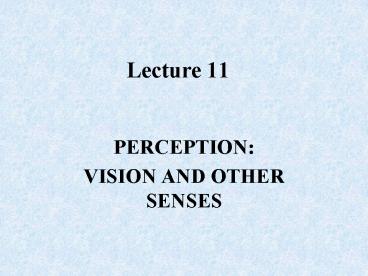PERCEPTION: - PowerPoint PPT Presentation
1 / 18
Title: PERCEPTION:
1
Lecture 11
- PERCEPTION
- VISION AND OTHER SENSES
2
Vision and sight
- Vision and sight are the ways of orienting in the
world - These are primary sources
- Assumption that in all societies the world is
perceived by the way of the sense of sight.
3
Visualism
- Visual bias in modern western societies is
sometimes called visualism or ocularcentrism - Everyday idioms I see what you mean,
far-sighted, perspective, etc. - Visualism goes back a long way in the history of
thought. - Aristotle ranking of senses. The lowest were
taste and touch animal senses. Smell, hearing
and sight were regarded human senses. Sight was
the highest of senses, according to Aristotle.
4
- Have you ever thought about experiences of a
blind person in our own society? - How do they get to know the world around them?
- For the sighted ones the world comes all at once,
but for the blind people it is a repetitive
tactile exploration of space around them. - We use the word blindness as a byword for
defectiveness, disorientation and ignorance. - Being blind certainly means exclusion from many
things in a society where everything is focused
on the visual.
5
Dialogue in the Darkan exhibition to discover
the unseen
- The concept is simple Visitors are lead by blind
guides in small groups through specially
constructed darkened rooms, in which scents,
sounds, wind, temperatures and textures conveys
the characteristics of daily environments, for
example a park, a city or a bar. In the dark, the
daily routine becomes a new experience. A
reversion of roles is created sighted people are
torn out of their familiar environments blind
people provide them with security and a sense of
orientation transmitting a world without
pictures. The impact is remarkable Dialogue in
the Dark have been presented in the last years
in 17 countries throughout Europe, Asia and
America.
6
- Yet other senses were significant too
- Constance Classen on olfactory (relating to
smell) distinction in 19th and 20th century
Europe. - The principal olfactory distinction was between
classes
7
- BUT
- Every culture has its own sensory model based on
the relative importance it gives to the different
senses. The sensory model is expressed in the
language, beliefs, and customs of a culture.
8
Two ethnographic studies
- In many non-western societies, the sense of sight
is not privileged over the other senses. - Paul Stollers ethnography of the Songhay people,
in Niger, West Africa - Alfred Gells study of the Umeda of Papua New
Guinea
9
The Songhay people
- Two musical instruments a single-stringed violin
and a gourd drum - Instruments are played at the spirit-possession
ceremonies - Noises are produced by the instruments. Spirits
are believed to exist as the sounds, not separate
beings that produce sounds. - In sorcery the sound heals or damages the
person.
10
The Umeda people
- The environment is dense and virtually unbroken
forest. - Therefore vision is not the primary sense.
Instead hearing and sense of smell are more
significant. - The world is apprehended dynamically.
11
- Concept of presence for Umeda
- Audible but invisible object is entirely
present - Hiding implies concealment of auditory clues
12
- Not only animals and plants but also landscape
features such as mountains, ridges, knolls, and
pools are grasped in the first place as movements
rather than static forms.
13
Phonological iconism
- The shaping of the word, in sound, bears some
correspondence to the sound-shape of the thing to
which the word refers. - There is nothing tree-like in the sound of the
word tree. - But in words such as bang, crash, hiss,
there seem to be a relation between word-sound
and meaning. Onomatopoeia. Relation between sound
and meaning is iconic. - According to Gell, the language of the Umeda is
iconic through and though.
14
Wolfgang Kohlers experiment
maluma
takete
15
- Psychologists have a term for this phenomenon
synaesthesia (the production of a mental sense
impression relating to one sense by the
stimulation of another sense) - But Gell argues that in this case it is not
synaesthesia, but onomatopoeia. Figures are
interpreted dynamically, in motion.
16
Vision and hearing
- With vision , it is as though we stand outside
the world - Vision sets up a distance between the spectator
and the object seen
- With hearing we are immersed within the world
- Sound penetrates the individual and creates a
sense of communication and participation
Thus auditory culture is a culture of
sympathy, according to Gell. Stoller states
sound penetrates the individual and creates a
sense of communication and participation
17
Anthropology of senses
- A recent field of research in anthropology
- Not to compare cultures in terms of their
different worldviews - But compare in terms of relative weighing of the
senses through which the people of one culture
perceive the world around them - The key question of the anthropology of senses
What is the world like to a culture that takes
actuality in less visual, more auditory and
olfactory, gustatory or tactile terms than those
to which we are accustomed? (David Howes)
18
- Inuit hunter is heavily dependent on his powers
of vision. But does he imagine himself standing
outside the world, looking from it afar? Inuit
are immersed in a dynamic environment where they
are participants rather than observers.































